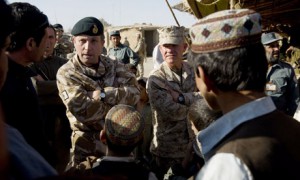
Huh?
‘We should have talked to Taliban' says top British officer in Afghanistan
Exclusive: General Nick Carter says west could have struck a deal with Taliban leaders after they were toppled a decade ago
Emma Graham-Harrison in Kabul
The Guardian,
The west should have tried talking to the Taliban a decade ago, after they had just been toppled from power, the top British commander in Afghanistan has told the Guardian, barely a week after the latest attempt to bring the insurgent group to the negotiating table stuttered to a halt.

General Nick Carter, deputy commander of the Nato-led coalition, said Afghan forces would need western military and financial support for several years after western combat troops head home in 2014. And he said the Kabul government may have to accept that for some years it would have only shaky control over some remoter parts of the country.
Speaking exclusively to the Guardian, he said: “Back in 2002, the Taliban were on the run. I think that at that stage, if we had been very prescient, we might have spotted that a final political solution to what started in 2001, from our perspective, would have involved getting all Afghans to sit at the table and talk about their future,”
Acknowledging that it was “easy to be wise with the benefit of hindsight”, Carter added: “The problems that we have been encountering over the period since then are essentially political problems, and political problems are only ever solved by people talking to each other.”
Phi Beta Iota: It is much — much — easier to get it right if you have a strategic analytic model; if you make decisions on the basis of intelligence with integrity; and if you demand — and have a public and allies and media that demand — ethical evidence-based decision-support. Absent those fundamentals, the people in charge of making decisions will always, without exception, make the wrong decisions for the wrong reasons. Statecraft demands integrity. Military campaigns, if they are to be successful, demand integrity at four levels — strategic, operational, tactical, and technical. Regime change — or regime reinforcement — if it is to be sustainable, demands Whole of Government and multinational consensual approaches. We owe the brave men and women that fight our wars a modicum of intelligence with integrity. We have a new crop of rising flag officers across the multinational spectrum; we dare hope that every single one of them is learning to challenge the USA for facts, and when those facts are not present, learning to say “no.” The past is past — why not define the present and the future with intelligence and integrity?
See Also:
Phi Beta Iota — every bit of it.



